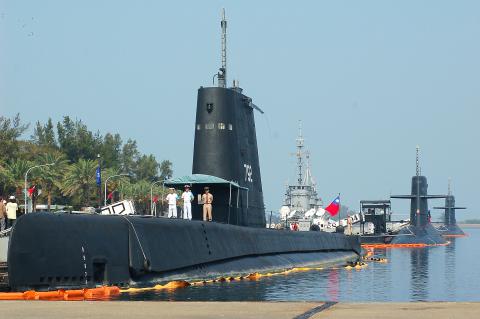Amid the lack of consensus on whether to procure or develop submarines, the navy’s lagging capabilities have become increasingly severe, a military analyst said yesterday.
Jyh-Perng Wang(王志鵬), associate researcher at the Association for Managing Defense and Strategies, said the nation’s Hailung-class Sea Dragon and World War II-era Guppy-class submarines were overburdened with numerous drills and battle missions, spending as much as 27 days per month at sea. The two Guppy-class are now used solely for training, -leaving only two Hailung-class subs for actual missions.
Wang said physical and mental stress in the navy, coupled with a “no hope for the future” mentality, could result in a wave of retirement among senior officers.

Photo: Hsu Shao-hsuan, Taipei Times
The 70-year-old Guppies, known as Sea Lion-class submarines, are in poor shape and require sustained maintenance, which is why every time the two submarines go out to sea, the Naval Command and Fleet Command are extremely nervous.
Crew on the subs are also constantly worried about accidents, which is why the burden now primarily falls on the two Dutch-made Hailung-class subs.
Sources have said that aside from battle missions, the two active submarines are responsible for “no-warning” and “warning” sea shark drills (or marine patrol operations), routine training assessment exercises by the fleet command, mine deployment and countering, as well as participation in the annual Han Kuang series of exercises. These drills take months to plan and execute, which could account for the exhaustion among officers.
Wang said that after more than 20 years of use, the Hailung-class subs were also getting old. When they entered service, they provided an edge against the vessels deployed by the People’s Liberation Army Navy, but now that China’s Song-class attack submarines were fitted with silencer tiles, it was time for the navy to retire its “-stegosaurus-class” subs and modernize.
Wang said he was concerned that salaries of between NT$30,000 and NT$40,000 per month offered by the navy were insufficient to retain personnel, since submarine crew are constantly under a lot of stress. The wave of senior officers who have retired early shows that the officers had lost confidence in the submarine fleet, which was a great loss for the navy.
ADDITIONAL REPORTING BY STAFF WRITER

The manufacture of the remaining 28 M1A2T Abrams tanks Taiwan purchased from the US has recently been completed, and they are expected to be delivered within the next one to two months, a source said yesterday. The Ministry of National Defense is arranging cargo ships to transport the tanks to Taiwan as soon as possible, said the source, who is familiar with the matter. The estimated arrival time ranges from late this month to early next month, the source said. The 28 Abrams tanks make up the third and final batch of a total of 108 tanks, valued at about NT$40.5 billion

Two Taiwanese prosecutors were questioned by Chinese security personnel at their hotel during a trip to China’s Henan Province this month, the Mainland Affairs Council (MAC) said yesterday. The officers had personal information on the prosecutors, including “when they were assigned to their posts, their work locations and job titles,” MAC Deputy Minister and spokesman Liang Wen-chieh (梁文傑) said. On top of asking about their agencies and positions, the officers also questioned the prosecutors about the Cross-Strait Joint Crime-Fighting and Judicial Mutual Assistance Agreement, a pact that serves as the framework for Taiwan-China cooperation on combating crime and providing judicial assistance, Liang

A group from the Taiwanese Designers in Australia association yesterday represented Taiwan at the Midsumma Pride March in Melbourne. The march, held in the St. Kilda suburb, is the city’s largest LGBTQIA+ parade and the flagship event of the annual Midsumma Festival. It attracted more than 45,000 spectators who supported the 400 groups and 10,000 marchers that participated this year, the association said. Taiwanese Designers said they organized a team to march for Taiwan this year, joining politicians, government agencies, professionals and community organizations in showing support for LGBTQIA+ people and diverse communities. As the first country in Asia to legalize same-sex

MOTIVES QUESTIONED The PLA considers Xi’s policies toward Taiwan to be driven by personal considerations rather than military assessment, the Epoch Times reports Chinese President Xi Jinping’s (習近平) latest purge of the Chinese People’s Liberation Army (PLA) leadership might have been prompted by the military’s opposition to plans of invading Taiwan, the Epoch Times said. The Chinese military opposes waging war against Taiwan by a large consensus, putting it at odds with Xi’s vision, the Falun Gong-affiliated daily said in a report on Thursday, citing anonymous sources with insight into the PLA’s inner workings. The opposition is not the opinion of a few generals, but a widely shared view among the PLA cadre, the Epoch Times cited them as saying. “Chinese forces know full well that